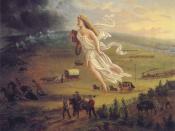No Place of Grace presents a dark and gloomy look at human existence and how the supposed "progress" made during the late 19th and early 20th centuries generally created more problems than it solved. The modernization process, which was considered at the time to be a moral and cultural advancement, ironically led to the destruction of both. Instead of becoming a time of progress and triumph for mankind this period became a time marked by the extensive introspection into one's life and the banality that had been created by their own hands. No Place of Grace attempts to spell out to the reader the many ways in which the modernization process of 1880-1920 succeeded in alienating the intellectual class by taking an in depth look at the various significant changes taking place and how those changes affected individuals and society as a whole.
The author, Jackson Lears, effectively enlightens the reader as to the factors that instigated the conception of new perspectives and thoughts about life and fulfillment.
This allows us to better comprehend why many of the elements of our current culture and society around us are the way they are and explore the foundations on which they evolved. The reader is able to step outside of their preconceived notions that through society and culture are both consciously and subliminally deposited in their mind and explore the elements that have caused their creation.
After reading this text, one can feel a sense of freedom from mentally shedding the ill-fitted, artificial skin of cultural dogma that pervades today's modern society. According to Lears, this same sense of freedom gained by removing the yoke of cultural expectation and ultimately deciding your own course was much of the focus of the anti-modernists of this era. They rebelled against the excessive modernization...


